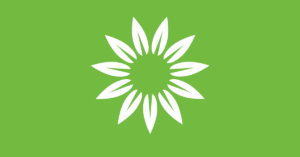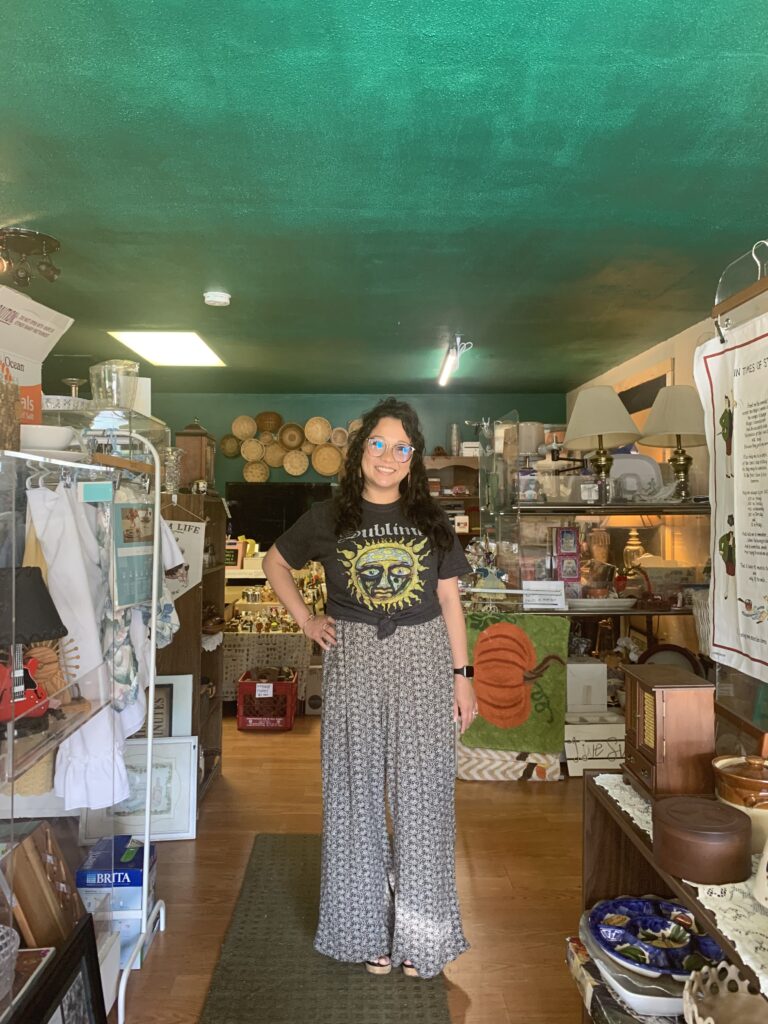
eco THRIFT owner Rachel LaBorde welcomes WHE to her shop in Robinson Twp, Pennsylvania.
In efforts to spread the word about the incredible work done to protect the environment in our communities, WHE (Women for a Healthy Environment) is highlighting a series of local vendors who prioritize sustainability in coming months using the Sustainable Business Spotlight. On Friday July 15, WHE’s Healthy Early Learning Program Manager, Portia Gillespie, and Communications and Policy Intern, Ava Roberts, met with eco-Thrift’s Rachel LaBorde to talk about her eco-focused thrift shop and the environmental benefits of thrifting.
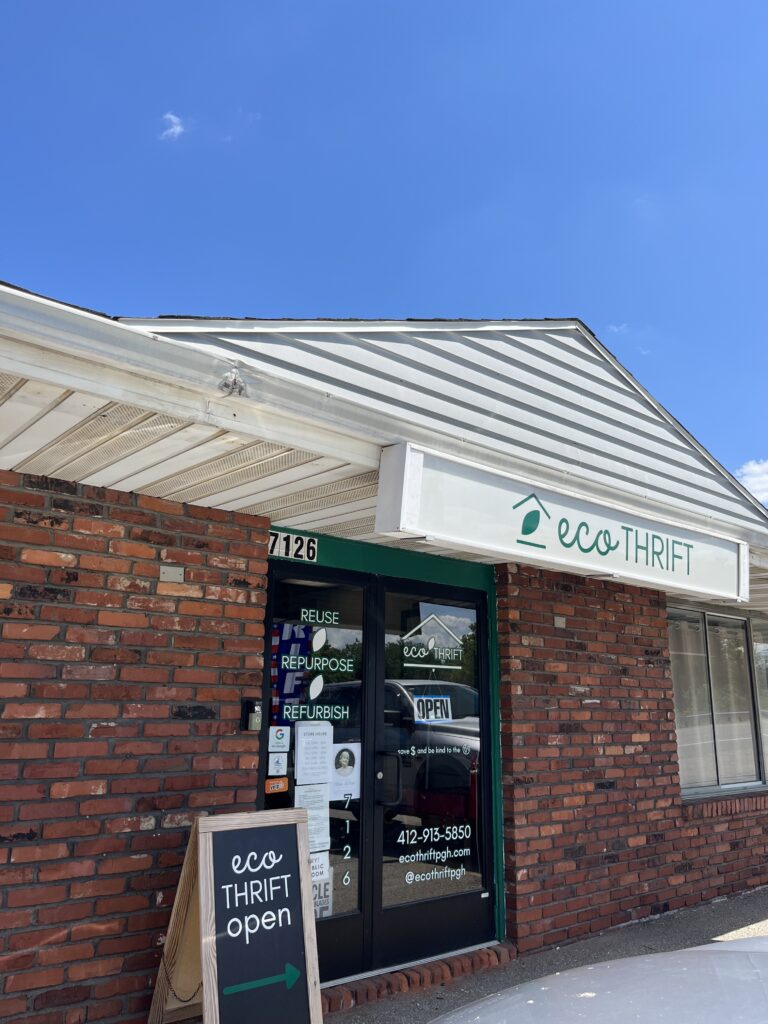
When asked about how eco THRIFT got its start, Rachel told us: “My husband, Gene and I opened eco THRIFT in 2021. We have always enjoyed thrifting in our spare time and are very eco-conscious in our day to day lives so opening a thrift store seemed like the perfect fit for us. Over consumption is such a huge problem in our world, if we can increase the number of people who choose to shop secondhand or the number of goods that end up in a landfill, then we are doing something great.”
eco THRIFT’s model not only stands out as one of only a handful of local sustainable businesses in the region, but also as a global trendsetter. Thrifting, seen as a more economical and sustainable way of shopping, has grown in popularity in recent years – where between 16-18% of Americans will shop at a thrift store during a given year, and the global resale market is expected to grow by 24% in 2022 alone and by 127% by 2026.
These trends are promising given that the fashion and textiles industry produced as much as 17 million tons of textile waste each year, and comprise 10% of all carbon emissions. According to Goodwill, thrifting is better for the environment because it results in less resource consumption and by extension, less demand for resources for production; fewer items getting thrown away into landfills; and less chemical pollution from manufacturing processes. Thus, businesses like eco THRIFT can make a real, positive difference on our environment both operationally and culturally.
*Interview has been edited for length.
Ava: Thanks so much for meeting with us today, we are excited to learn more about eco THRIFT! WHE hopes to highlight local businesses like yours that share prioritization of reducing their environmental impact – and eco THRIFT seems like a place to do just that! How did your business get started?
Rachel: My husband and I opened eco THRIFT in 2021 because we have always been avid thrifters. We wanted to open in 2020, but obviously we had to wait because of COVID. We set out to reduce waste and do things in an environmentally friendly manner by using low waste practices. Thankfully, everything we brought in – down to our cash register, which was a family heirloom made in 1928 – was used or passed down to us from family! We also use 100% repurposed packaging, avoid using anything plastic, like tags, so they can be reused, and utilize chalk boards so we do not have to waste paper to print anything out.
Ava: It is so inspiring to hear that you incorporate sustainability into every level of your business model, and that some of these items here have deeper family ties! What types of products do you sell, and what do you think readers should know about your store?
Rachel: We do our best to have a little bit of everything – including a variety of items including home goods, clothing, books, games, and vintage items.
Ava: Impressive! And if you could pick one item in this whole store to take home with you right now, what would it be?
Rachel: Hm. That is a hard one. I would say this old chest (see below) that would be a cute coffee table or side table.
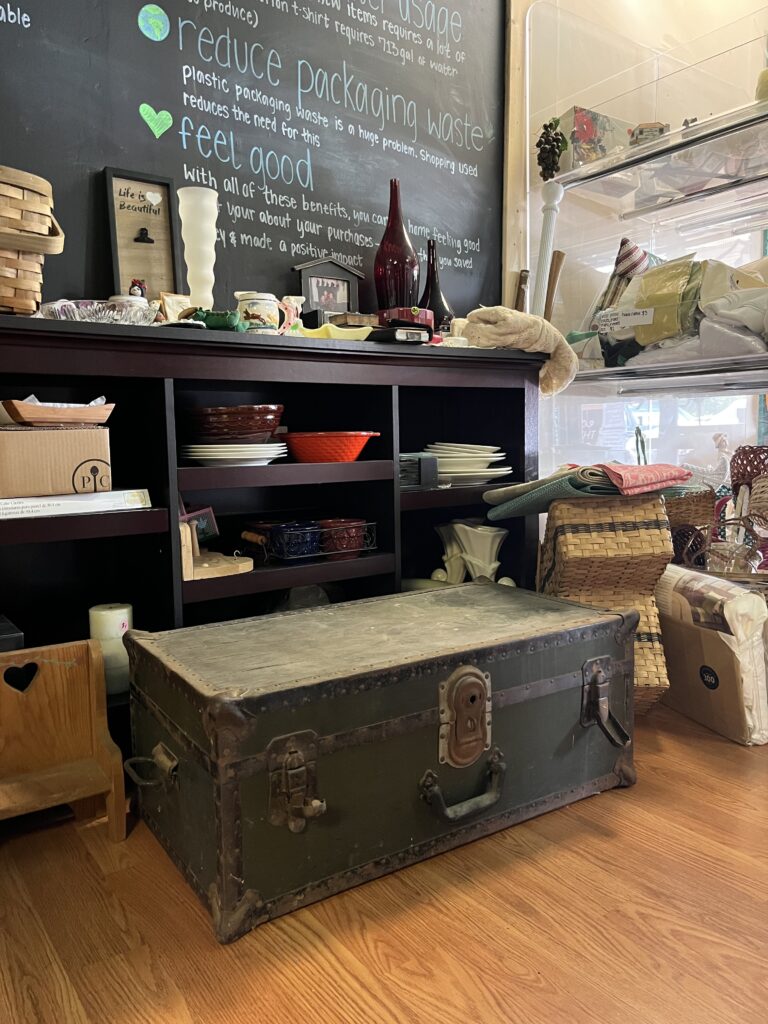
Ava: So, let us transition a bit into a new topic. Research shows that secondhand fashion plays a key role in creating a less wasteful industry. Could you speak as to how that awareness plays into your business model? What are some practices that reduce your carbon and waste footprint?
Rachel: Over the last few years, I strived to highlight the benefits of vintage and thrift shopping to help make it cool again – because people have this [incorrect] impression that thrift stores are dirty or unappealing. In addition to the low waste practices I previously described, we make sure everything we sell is in good condition. We get many products from estate sales. We also do a lot through [recycling company] Teracycle, and Planet Aid, which recycles our unused textiles, and we also partner with other local vendors to recycle or repurpose items we do not sell. We try to be as low waste as possible, so we are also conscious of what we take as donations – we do not want to end up throwing things away when we are trying to repurpose everything! We also do 90% of e-receipts to avoid paper waste. Finally, we partner with Blue Kangaroo to send clothes we do not sell to kids who need them most.
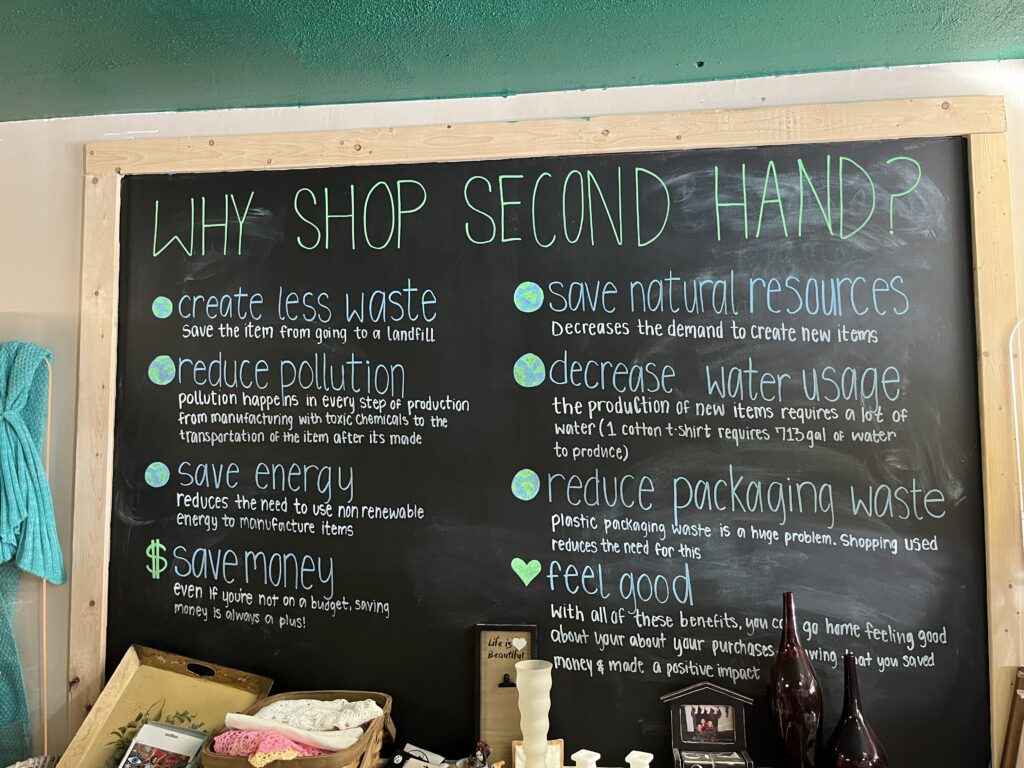
Ava: So, it sounds like this reduction of waste is certainly a big part of the way you do business. I have noticed that what seems to be holding other businesses back from operating sustainably is this mindset that you either must be sustainable and reduce your profits, or continue with business as usual and improve profits. Have you seen evidence in your business that you can combine sustainability practices and financially benefit from that?
Rachel: If anything, sustainability practices save us money. If we had started the business by buying new things, we would have spent triple the money. Operating costs are lower because of these sustainable practices, so that leaves us more opportunities to make profit.
Ava: I bet that is encouraging for a lot of business owners or people considering starting a sustainable business out there! What strengths do you think come with your sustainable business model, and what challenges have you faced and how did you address them?
Rachel: Over the last few years throughout the pandemic, cleanliness concerns caused a lot of single-use items like masks and hand sanitizers to contribute to waste, so it has been a challenge reframing our relationship with reusable items. Our business model, though, encourages eco-consciousness in many aspects of others’ lives and improves peoples’ relationship with buying or upcycling used items.
Ava: I think your example shows the strengths of upcycling, for sure! What recommendations would you provide for someone looking to up a similar eco-friendly business or adopt a more sustainable way of doing business?
Rachel: Make sure you utilize all your surrounding resources. Between buy-nothing groups, family members, friends, etcetera, you can usually find what you need. Anything you need can be reused. When you really look, there is a swap for everything, so use what you have at your disposal first and go from there.
Ava: That’s great advice and something that, even working here, I need to prioritize more often. Relatedly, since we are highlighting ways to get out of the single-use mindset this month in July at WHE, what are some cool tips to go reusable?
Rachel: There are so many options available to you to go reusable – whether that be bringing your own straws, mugs, or take-out containers. I also have started picking up cool dishes at thrift stores, taking it to social events and serving food out of it, and then leaving the dish as a gift. That way, my friends can re-use it too.
Ava: What do you think these trends towards sustainability mean for the future of business?
Rachel: They are changing everything. Everything is becoming more digital, and businesses are going to have to make changes to keep customers and profits. I think we [at eco THRIFT] are in a place to be on the forefront of the environmentally friendly business movement.
Ava: Thank you for your time and important work – we cannot wait to check out your selection!
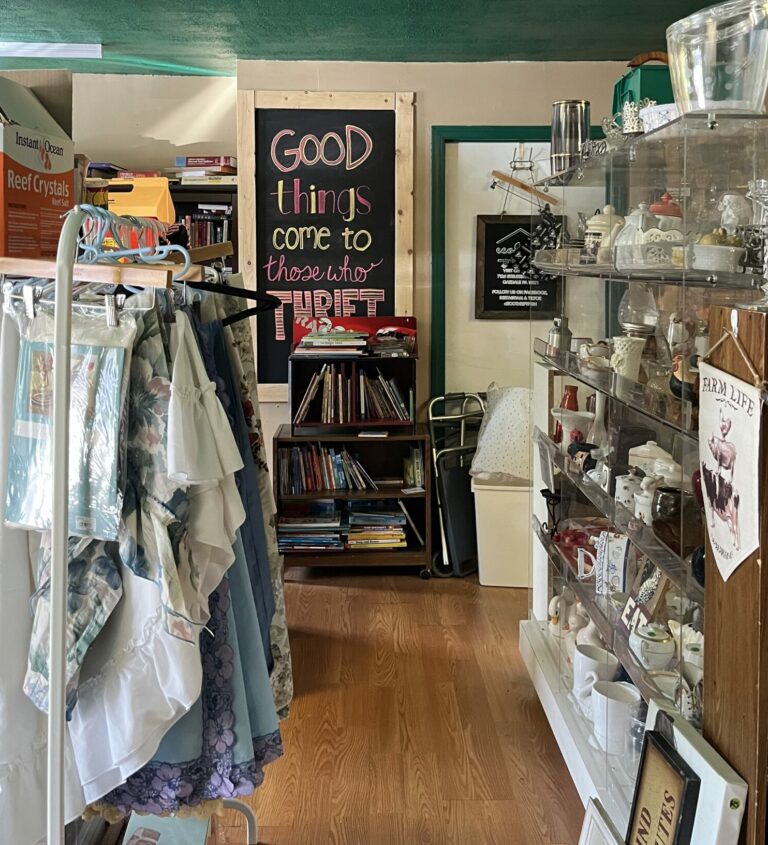
For more information about eco THRIFT, contact Rachel LaBorde at ecothriftpgh@gmail.com or connect with them on social media at @ecothriftPGH. For more information about WHE programming or this interview, contact Healthy Learning Program Manager Portia Gillespie (portia@womenforahealthyenvironment.org), or Ava Roberts (ava@womenforahealthyenvironment.org)


